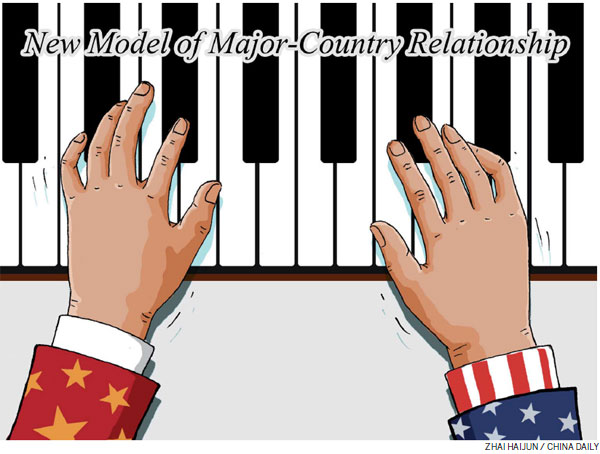A step forward in Sino-US relations
Updated: 2015-10-09 07:21
By Giles Chance(China Daily Europe)
|
|||||||||||
Xi helped write a new chapter in the story of two residents who have to get along
Xi Jinping's visit to the United States for a week from Sept 22 was his first US state visit, and the sixth time he had met President Barack Obama since becoming Chinese president in 2013.
The growing importance of the Sino-US relationship has been met by the creation of a clear framework for dialogue between these two superpowers, including the annual Sino-US Strategic Dialogue, established in 2009, and state visits by either leader to the other's country, against a background of constant discussion (and sometimes argument) in one or the other of the main global forums such as the UN Security Council. Compared with 20, even 10 years ago, both superpowers are much better acquainted now with each other.

Yet the gulf in attitude and perception between China and the US remains wide, such are the differences in historical experience and culture. Americans believe that the Sino-US relationship should reflect the continued global economic and military dominance of their own country. Most Chinese think that their country is reaching economic parity with the US, and should be treated as an equal in the relationship.
Americans have an innate distrust of one-party political systems, and think that every country would be better if it was like itself. China believes that each country should be free to follow the government system that suits it best, and should not interfere in the political systems of other countries.
Many Americans think that China's actions in the South China Sea are a prelude to an aggressive wielding of Chinese power and influence throughout Asia, and probably elsewhere. But China sees itself as a peaceful country that is forced to take limited preemptive actions to assure its own independence and freedom of action in the area that surrounds it.
It is easy to see that China and the US have many more things separating them than keeping them together. In particular, the relationship of the US with Taiwan, and the 1979 Taiwan Relations Act that guarantees American support for Taiwan in the event of attack is, for Chinese minds, the most contentious, and intolerable part of the Sino-US relationship. What business is it of the Americans, many Chinese feel, to involve themselves in a disagreement that is between Chinese and involves only China?
But, of course, both China and the US have a great deal to gain from cooperating, and much to lose by allowing hostility and negative thoughts to overwhelm the relationship.

Their economic interdependence, already great, grows stronger every day. Despite strongly growing US exports to China, the overall trade deficit continues to widen in China's favor, as US consumers become ever more dependent on Chinese-made clothing and electronic goods. US investment in China continues to increase, while Chinese investment the other way is growing fast. American business models remain a trailblazer for many Chinese companies, while America's famous universities are at the top of most Chinese graduate students' wish lists.
Growing Chinese influence around the world makes China an essential part of every important regional or global peace treaty. The recent agreement to lift Iran's nuclear sanctions in return for an Iranian commitment to curtail its nuclear program could not have been achieved without the role China played.
It is against this complex, constantly shifting background that the Chinese president made his recent visit to Seattle on the US west coast to meet representatives of 10 principal technology companies, then to Washington, to initiate an agreement with Obama on cybersecurity, and finally to New York to address the United Nations.
Many Americans doubted that companies like Apple, IBM, Microsoft and Facebook would turn out to see Xi. In the event, the doubters were wrong. The CEOs of the companies invited were all there to listen to Xi before the group photograph. If a reminder was needed about the size and significance of China's huge market for American business, this occasion provided it.
Many onlookers were surprised at China's willingness to meet the US halfway on cybersecurity. But the Americans had made a big effort in the run-up to the meeting to show how seriously they regarded this issue, and the Chinese responded positively.
In New York, Xi emphasized China's commitment to its role as a major power by pledging new people and resources to the UN, particularly in Africa.
The visit underlined some of the new ideas Xi brought to the traditional framework of Chinese foreign policy, which emphasizes peaceful coexistence promoting economic development. These include emphasis on the defense of China's "core interests" alongside the reiteration of China's desire for peaceful coexistence; the need for new institutions focused on Asian development which can work together and in parallel with existing institutions like the International Monetary Fund and the World Bank; a renewed emphasis on China never seeking development at the expense of any other country's interests; and a focus on cooperative relations between the major powers by adopting the new concept of a "new model of major-country relations".
In this sense, with China proposing new ideas and types of relationship and the US responding, China under Xi has become the innovator in the Sino-US relationship. This places the US in an unfamiliar position of a responder, in place of the role of initiator and decider, which better fits the concept many Americans have of their relations with other countries, including China.
The reality is that the US, stung by the failure of its military interventions in Afghanistan and Iraq, has become tired of expensive, complex foreign involvements. It is going through one of its periodic international withdrawals so it can focus on its own economy and domestic affairs.
This mood of withdrawal inevitably affects US relations with China, against a background of growing Chinese involvement and interest in global affairs. It is inevitable therefore, and probably good, that China under Xi is willing and able to redefine the country's global role, and its relationship with the US, in dynamic and constructive new ways.
Perhaps overwhelmed by the simultaneous arrival of Pope Francis on his first visit to the US, the US media played down Xi's visit in comparison with the headlines that marked earlier Chinese presidential visits. The novelty has worn off. Chinese presidents are not objects of fascination in the US anymore. They have become more like a visit from the neighbor who lives in the big house down the road, someone who we don't see every day but we are always aware of, and someone we know we have to get along with, even if we disagree quite often.
Despite the many historical and cultural factors that divide China and the US, the Sino-US relationship is the one that has to work. Both sides in the relationship know that. Like two people with a leg tied to the other in a three-legged race, the US and China are learning how to move forward together. Xi's visit was an important step in that process.
The author is a visiting professor at Guanghua School of Management, Peking University. The views do not necessarily reflect those of China Daily.
(China Daily European Weekly 10/09/2015 page10)
Today's Top News
FIFA suspends Blatter, Platini from world soccer
Merkel, Hollande appeal to MEPs for EU unity
China adopts IMF statistical benchmark, improves transparency
Fujian governor investigated
China's population to peak in 2025
Beijing says it welcomes TPP deal
Holidayers face hurdles in the homestretch
Snowden: I'd go to prison to return to US
Hot Topics
Lunar probe , China growth forecasts, Emission rules get tougher, China seen through 'colored lens', International board,
Editor's Picks

|

|

|

|

|

|






